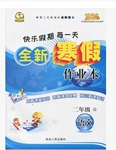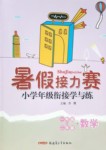题目内容
假定英语课上老师要求同桌之间交换修改作文,请你修改你同桌的以下作文。文中共有10处语言错误,每句中最多有两处,每处错误仅涉及一个单词的增加,删除或修改。
增加: 在缺词处加一个漏字符号(^),并在其下面写出该加的词。
删除:把多余的词用斜线(\)划掉。 修改: 在错词下划一横线,并在该词下面写出修改后的词。
Li Ying often forgets something, but her classmates call her “Miss Forgetful”. One day, her mother asked her buy something and gives her a shopping list. When she got to the shop, she bought all the things on the lists. Then it was time to pay to them, but she forgot to take money with her, which was left on the dining table at home. So she has had to go back to fetch the money. When she finally went back to a shop again, she paid money but forgot to take that she had bought. Lucky, the shop owner called him back in time.
1.将but改为and/so
2.加上to
3.将gives改为give
4.将lists改为list
5.将to改为for
6.将a改为the
7.将that改为what
8.将lucky改为luckily
9.将him改为her
【解析】
试题分析:本文主要讲了,李莹经常忘记自己的东西,于是她的同学叫她忘记小姐,并举例证明她经常忘记东西的事实。
1. 。由于前面一句话的意思是李莹经常忘记自己的东西,后面一句话的意思是她的同学叫她忘记小姐,这两句话明显是递进关系或是因果关系,句意为李莹经常忘记自己的东西,于是(所以)她的同学叫她忘记小姐,故将but改为and/so。
2. sb to do sth叫某人做某事,句意为她的妈妈叫她去买一些东西并给了她一份购物清单,故加上to。
3.
4. the list列表中的,纸上列出来的,由于是一份单子,所以用单数。句意为她购买了清单上所有的物品,故将lists改为list。
5. for支付,该句意思为到了付钱的时候,但是她忘了带钱,钱被留在家里的桌子上了,故将to改为for。
6.
7. had bought是用来修饰该代词的,意思为她买的东西,指物,句意为当她最后再一次返回到商店中,她付了钱,但是忘了拿走她买的东西,故用what。
8.
9.
考点:考查单词和语法。

 桃李文化快乐暑假武汉出版社系列答案
桃李文化快乐暑假武汉出版社系列答案 优秀生快乐假期每一天全新寒假作业本系列答案
优秀生快乐假期每一天全新寒假作业本系列答案 暑假接力赛新疆青少年出版社系列答案
暑假接力赛新疆青少年出版社系列答案